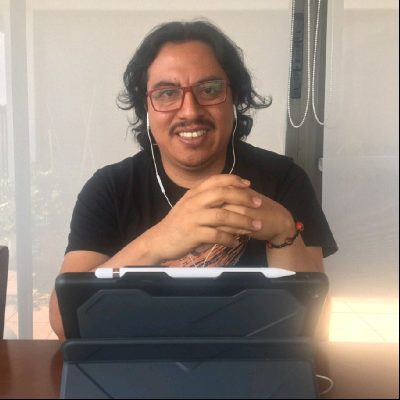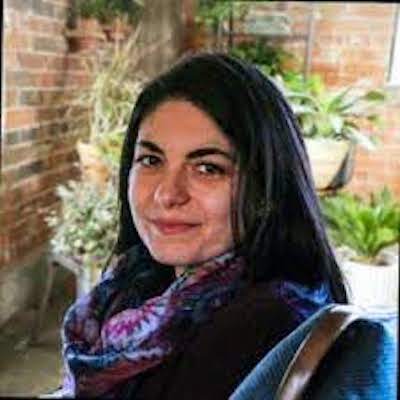11 Mi palabra, nuestro mundo
My Word, our World
Kiado Cruz and Teodora C. Hasegan, Translator
Sueño con mi lengua y muchas otras lenguas posibles,
una diversidad lingüística rica y hermosa.
Pertenezco a la comunidad de Santa Cruz Yagavila, ubicada en la Sierra de Juárez. Allí está enterrado mi ombligo y el de mis abuelos. Allí es donde vivo. Allí florece mi familia, junto a la milpa que cultivamos. Podría decir que soy la comunidad, puesto que yo pertenezco a ella y ella a mí. Pero al mismo tiempo, cada uno de nosotros es la comunidad. La idea de comunidad es simplemente nosotros mismos, y sólo existe en nosotros que somos.
Hoy en día, estamos inmersos en la globalización, la tecnología y el Internet, ya sea como indígenas, mestizos, latinoamericanos, europeos, etc. Estos recursos tecnológicos son adaptados mediante el uso de las lenguas indígenas y la tecnología adecuada a los contextos que las rodean. En este sentido, la lengua se convierte en una ventana para la comunicación con la tecnología, incluyendo al zapoteco.
En los últimos años, hemos visto un aumento en el uso de lenguas indígenas en el ciberespacio. Muchas lenguas están presentes en redes sociales y plataformas de localización de software libre. Sin embargo, también estamos experimentando una acelerada pérdida de diversidad lingüística, y se estima que en la próxima década más de la mitad de las lenguas del mundo van a desaparecer. Es por eso que es crucial desarrollar políticas y programas que fortalezcan los procesos de recuperación y revitalización lingüística.
Es así como surge la idea de traducir el navegador Firefox al zapoteco, anticipando un proyecto más grande que contempla la creación de un sistema operativo que se adapte a las características regionales del pueblo zapoteco. En 2006, iniciamos la traducción con la participación de una docena de lenguas indígenas de Latinoamérica, en una iniciativa llamada Mozilla Nativo, con el acompañamiento de la Fundación Mozilla. El proyecto consistió en el desarrollo de la localización en zapoteco y en otras lenguas indígenas de México. Sin embargo, encontramos algunas limitaciones a la hora de encontrar sinónimos y formas de adaptar el zapoteco a la localización del software binario. Podemos traducir una palabra, pero muchas veces los términos se quedan en inglés, porque son las que dan las órdenes para que lo que visualizamos suceda en la pantalla.
Es importante destacar que el proceso de la creatividad computacional abarca tanto cuestiones teóricas como prácticas. Cuando hablamos de la traducción de software y de programación sublime, se utiliza otro lenguaje que da la orden para que eso suceda y que es fundamental en el proceso de desarrollo de la traducción de aplicaciones.
Este proceso de traducción nos ha servido como un aprendizaje, más que como algo que resuelva nuestros problemas fundamentales. Hemos ido avanzando en la apropiación de la tecnología, que muchas veces se enfoca en lo individual en lugar de lo colectivo.
Es importante situar a las lenguas indígenas en el ejercicio de los derechos lingüísticos para el acceso a la información pública, lo cual permite desplegar una estrategia a largo plazo para democratizar los medios de comunicación. Creo que el acceso lingüístico integral es parte fundamental de una sociedad justa y equitativa. El vínculo entre los movimientos de derechos humanos y sociedad civil permitirá a todas las personas participar plenamente en asuntos de interés público, y todas las personas tienen derecho a que sus idiomas sean respetados y reconocidos en los espacios públicos por los gobiernos y la sociedad en general.
Estamos buscando democratizar los bienes comunes y apropiarnos de la tecnología. Si accedemos a los medios de producción digitales, no solo estamos ejerciendo un derecho, sino que estamos aprovechando los recursos digitales en relación a la investigación académica, el acceso abierto al conocimiento y a la cultura. Narrar lo que se ha perdido, transformado y modificado en estas lenguas nativas es urgente y crucial, y debemos hacer énfasis en aquellos elementos y prácticas que componen y hacen parte de la dinámica cotidiana en los territorios lingüísticos y digitales.
Además, el cambio climático pone en peligro las lenguas del mundo, y tenemos alrededor de 50 años para buscar justicia climática y preservar la diversidad lingüística para compartirla en el futuro con otras comunidades y el resto del mundo. Las memorias colectivas nos hablan de los sentimientos del tiempo que vivimos; de las relaciones que creamos, los cambios que vimos venir, los animales y plantas con los que convivimos y nos alimentamos, las palabras que escuchamos y los fenómenos que nos preocupan. Este texto es nuestro esfuerzo y deseo de construir una historia colectiva en tiempos de crisis ambiental y climática.
My word, our world
(translated by Teodora C. Hasegan)
I dream of my language and many other possible languages,
a rich and beautiful linguistic diversity.
I belong to the community of Santa Cruz Yagavila, located in the Sierra de Juárez. My navel and that of my grandparents are buried there. There is where I live. My family thrives there, next to the cornfields we cultivate. I could say that I am the community, since I belong to it and it belongs to me. But at the same time, each of us is the community. The idea of community is simply ourselves, and it only exists in us who we are.
Today, we are immersed in globalization, technology and the Internet, whether as Indigenous people, mestizos, Latin Americans, Europeans, etc. These technological resources are adapted through the use of Indigenous languages and technology appropriate to their contexts. In this sense, the language becomes a window for communication with technology, including Zapotec.
In recent years, we have seen an increase in the use of Indigenous languages in cyberspace. Many languages are present on social networks and free software localization platforms. However, we are also experiencing an accelerated loss of linguistic diversity, and it is estimated that in the next decade more than half of the world’s languages will disappear. That is why it is crucial to develop policies and programs that strengthen linguistic recovery and revitalization processes.
This is how the idea of translating the Firefox browser into Zapotec arose, anticipating a larger project that envisions the creation of an operating system that adapts to the regional characteristics of the Zapotec people. In 2006, we began the translation including a dozen Indigenous languages from Latin America, in an initiative called Mozilla Nativo, with the support of the Mozilla Foundation. The project consisted of the development of localization in Zapotec and other Indigenous languages of Mexico. However, we found some limitations when it came to finding synonyms and ways to adapt Zapotec to the localization of binary software. We can translate a word, but many times the terms remain in English, because they command what we visualize to appear on the screen.
It is important to highlight that the process of computational creativity includes both theoretical and practical issues. When we talk about software translation and sublime programming, another language is used that commands this to happen and it is fundamental in the process of developing translation applications.
This translation process has served as a learning experience for us, rather than as something that solves our fundamental problems. We have been advancing in the appropriation of technology, which often focuses on the individual rather than the collective.
It is important to place Indigenous languages in exercising linguistic rights for access to public information, which allows the deployment of a long-term strategy to democratize the media. I believe that comprehensive linguistic access is a fundamental part of a just and equitable society. The link between human rights and civil society movements will allow all people to participate fully in matters of public interest, and all people have the right to have their languages respected and recognized in public spaces by governments and society in general.
We are seeking to democratize the common goods and appropriate technology. If we access digital means of production, we are not only exercising a right, but we are taking advantage of digital resources in relation to academic research, to open access to knowledge and culture. Taking about what has been lost, transformed and modified in these native languages is urgent and crucial, and we must emphasize those elements and practices that make up and are part of the daily dynamics in linguistic and digital territories.
Furthermore, climate change endangers the world’s languages, and we have about 50 years to pursue climate justice and preserve linguistic diversity to share with other communities and the rest of the world in the future. Collective memories tell us about the emotions of the time we live in; of the relationships we create, the changes we saw coming, the animals and plants with which we live and feed, the words we hear and the events that concern us. This text is our effort and desire to build a collective history in times of environmental and climate crisis.


